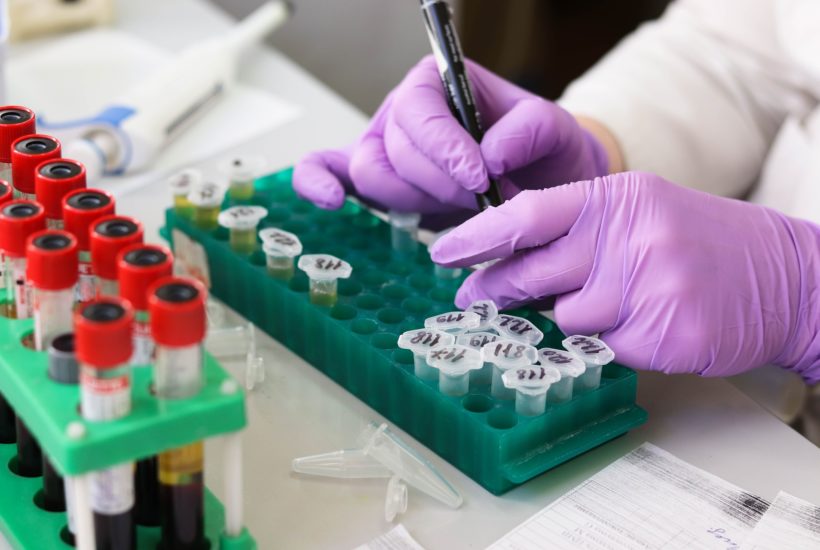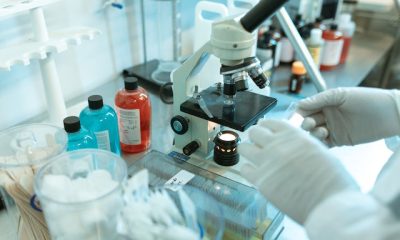Biotech
Large-scale testing is the only way to reduce the spread of Covid-19
As the World Health Organization calls on countries affected by the coronavirus epidemic to test more, rapid diagnostic tests are finally coming to the market. The United States, long behind, is multiplying authorizations to use these tests, which reduce waiting times to a few minutes. According to WHO, the only way to halt the pandemic is by large-scale testing.

The call by Tedros Adhanom Ghebreyesus, WHO Director-General, to generalize Covid-19 diagnostic tests was a warning to many countries, including France. The absence of large-scale testing makes the monitoring of the Covid-19 pandemic fragile. Faced with this need, many solutions are now coming to the market to take over and amplify the PCR tests, which are carried out on machines in hospitals.
Download our companion app, Born2Invest, and be the first to find out the latest information about the coronavirus pandemic. Read all economic news from around the world, with the best news aggregator, available for free.
The FDA is increasing the number of approvals
Last weekend, the Californian laboratory Cepheid received, from the FDA, an emergency use authorization for its Covid-19 rapid diagnostic test. In combination with the supplier’s GeneXpert machine, the test is now capable of delivering a result in just 45 minutes. In a press release, Cepheid stated that it has more than 23,000 GeneXpert devices available worldwide.
Among French companies, bioMérieux distinguished itself by also obtaining the FDA’s approval for its Biofire diagnostic test. The French laboratory’s test, which is also fully automated, is capable of providing results in 45 to 75 minutes, said bioMérieux. Prior to this, Novacyt, through its UK subsidiary PrimerDesign, had also obtained the green light from the US authority and increased its production capacity accordingly.
All these announcements are showing the progress made in the last two weeks on the subject. On March 16th, the Swiss laboratory Roche announced that it had received FDA’s approval to market its diagnostic test for its Cobas devices. A test capable of delivering a result in just over three hours.
However, behind the multiplication of tests intended for hospitals, other types of tests are beginning to be available on the market, to simplify and accelerate the diagnosis of Covid-19.
Rapid tests for Covid-19 are also available on the market
California-based Mesa Biotech announced in a press release that it has received FDA’s approval for its portable test, capable of giving a result in just 30 minutes. The test is designed to be used directly at the point of care, by the healthcare professional, without going through a testing laboratory. The test uses traditional nasopharyngeal swabs combined with a hand-held PCR testing device.
The American biotech company Aytu Bioscience is working on Covid-19 tests that are even faster, providing a result within an announced time frame of between 2 and 10 minutes. Unlike other diagnostic tests, this one relies on immunochromatography technology and the detection of IgG/IgM antibodies. These antibodies are part of the body’s immune response to coronavirus. The test can be performed with a sample of blood, plasma or serum from the patient who is being tested.
However, the company is awaiting the FDA’s approval but has received the authority to begin the distribution of 100,000 tests in the United States.
IgG/IgM technology is also used by the South Korean company Sugentech, which has already launched its SGTi-Flex test on the market. Other suppliers should soon follow, especially for the European market.
It remains to be seen whether they will be able to meet a demand that is expected to explode in the coming weeks with the progress of the Covid-19 pandemic. In France, the shortage of reagents has been cited as one of the reasons for the low number of tests carried out in comparison with other European countries, such as Germany.
__
(Featured image by Belova59 via Pixabay)
DISCLAIMER: This article was written by a third party contributor and does not reflect the opinion of Born2Invest, its management, staff or its associates. Please review our disclaimer for more information.
This article may include forward-looking statements. These forward-looking statements generally are identified by the words “believe,” “project,” “estimate,” “become,” “plan,” “will,” and similar expressions. These forward-looking statements involve known and unknown risks as well as uncertainties, including those discussed in the following cautionary statements and elsewhere in this article and on this site. Although the Company may believe that its expectations are based on reasonable assumptions, the actual results that the Company may achieve may differ materially from any forward-looking statements, which reflect the opinions of the management of the Company only as of the date hereof. Additionally, please make sure to read these important disclosures.
First published in INDUSTRIE Pharma, a third-party contributor translated and adapted the article from the original. In case of discrepancy, the original will prevail.
Although we made reasonable efforts to provide accurate translations, some parts may be incorrect. Born2Invest assumes no responsibility for errors, omissions or ambiguities in the translations provided on this website. Any person or entity relying on translated content does so at their own risk. Born2Invest is not responsible for losses caused by such reliance on the accuracy or reliability of translated information. If you wish to report an error or inaccuracy in the translation, we encourage you to contact us.

-

 Impact Investing2 weeks ago
Impact Investing2 weeks agoInter IKEA Launches Electric Truck Fleet to Decarbonize Heavy-Duty Logistics in Italy
-

 Markets6 days ago
Markets6 days agoCotton Market Weakens Amid Demand Concerns and Bearish Trends
-

 Crypto2 weeks ago
Crypto2 weeks agoIs Strategy’s Bitcoin Bet Becoming a Dangerous House of Cards?
-

 Fintech4 days ago
Fintech4 days agoFintech Alliances and AI Expand Small-Business Lending Worldwide

























